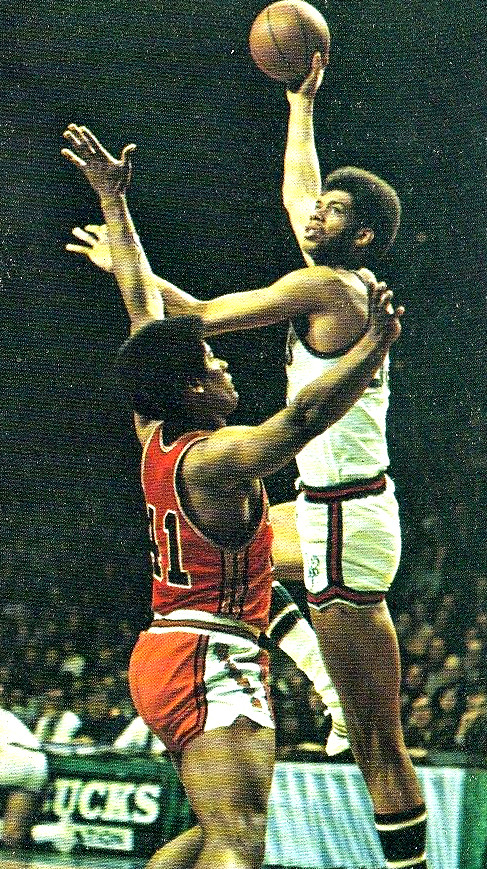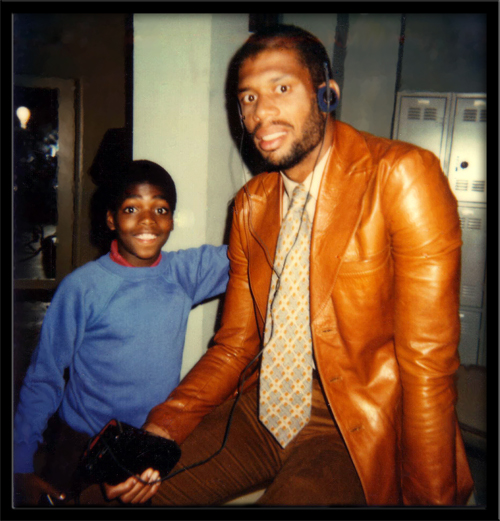Kareem Abdul-Jabbar (Part 1)
Kareem Abdul-Jabbar (Part 1)

Kareem Abdul-Jabbar, born Ferdinand Lewis Alcindor Jr. on April 16, 1947, is a retired American professional basketball player known for his remarkable career in the NBA. He played 20 seasons in the league, representing the Milwaukee Bucks and the Los Angeles Lakers.
During his illustrious career as a center, Abdul-Jabbar achieved numerous accolades and records. He won the NBA Most Valuable Player (MVP) award six times, was selected to the NBA All-Star Game 19 times, and earned All-NBA Team and All-Defensive Team honors multiple times. He was a crucial member of six NBA championship teams as a player and two more as an assistant coach, earning NBA Finals MVP honors twice.
Abdul-Jabbar holds several NBA records, including the career scoring record of 38,387 points, which stood until LeBron James surpassed it in 2023. He is widely regarded as one of the greatest basketball players of all time, with many basketball legends, including Pat Riley, Isiah Thomas, and Julius Erving, hailing him as the greatest player ever.
Before his NBA career, Abdul-Jabbar, then known as Lew Alcindor, had a remarkable high school and college career. He led Power Memorial High School to 71 consecutive wins and won three consecutive NCAA championships with the UCLA Bruins under legendary coach John Wooden. Drafted by the Milwaukee Bucks as the first overall pick in the 1969 NBA draft, he immediately made an impact, leading the Bucks to their first NBA championship in 1971.
Abdul-Jabbar's signature skyhook shot made him one of the most dominant scorers in NBA history. He continued his success after being traded to the Los Angeles Lakers in 1975, contributing to five more NBA championships for the team. Throughout his career, he made 18 playoff appearances, reaching the NBA Finals 10 times.
At the time of his retirement in 1989 at the age of 42, Abdul-Jabbar held numerous NBA records, including points scored, games played, minutes, field goals made, blocked shots, and defensive rebounds. He remains one of the most influential figures in basketball history, earning recognition as the greatest center of all time by ESPN and receiving the Presidential Medal of Freedom from President Barack Obama in 2016.
Kareem Abdul-Jabbar was born in Harlem, New York City, the only child of Cora Lillian and Ferdinand Lewis Alcindor Sr. Cora, originally from North Carolina, moved to Harlem as part of the Great Migration, while Ferdinand Sr. was the child of immigrants from Trinidad. Abdul-Jabbar's uncle was Dr. John Alcindor, a prominent Black activist and medical pioneer. Growing up in the Dyckman Street projects in the Inwood neighborhood of Upper Manhattan, Abdul-Jabbar experienced challenges due to his height, often feeling self-conscious about the stares and comments he received.
From an early age, Abdul-Jabbar displayed remarkable talent in basketball. By the age of nine, he was already significantly taller than his peers, standing at 5 feet 8 inches. By eighth grade, he had reached a towering height of 6 feet 8 inches and could dunk a basketball. His high school career at Power Memorial Academy under coach Jack Donohue was marked by incredible success, leading the team to three consecutive New York City Catholic championships and an impressive 71-game winning streak. Abdul-Jabbar's dominance on the court earned him the nickname "The Tower from Power."
Despite his basketball achievements, Abdul-Jabbar faced racial discrimination, including a strained relationship with his coach, who used a racial slur against him. The Harlem riot of 1964, sparked by the fatal shooting of a black teenager by a police officer, further fueled Abdul-Jabbar's interest in racial politics. He became determined to embrace his identity and use his platform to advocate for social change, declaring his commitment to embodying "Black Power in the flesh."
Abdul-Jabbar's path to playing professionally in the NBA was not straightforward. Due to league rules at the time, he was unable to enter the NBA directly from high school and had to wait until he could have hypothetically graduated from college. Despite being heavily recruited by numerous colleges and also having offers to play for the Harlem Globetrotters or overseas, Abdul-Jabbar's priority was to pursue higher education. He ultimately chose to attend the University of California, Los Angeles (UCLA), where he was recruited by assistant coach Jerry Norman.
Standing at 7 feet 1 inch tall, Abdul-Jabbar began his college career on the freshman team at UCLA, as freshmen were not eligible to play varsity until 1972. Despite this limitation, Abdul-Jabbar's freshman team boasted an impressive roster, including other high-school All-Americans like Lucius Allen, Kenny Heitz, and Lynn Shackelford. In his first public appearance for UCLA in an exhibition game against the varsity team, Abdul-Jabbar showcased his talents with a remarkable performance, scoring 31 points and grabbing 21 rebounds to lead the freshman team to a victory over the defending national champion varsity team. This victory marked the first time a freshman team had defeated the UCLA varsity squad, drawing significant attention and anticipation for Abdul-Jabbar's future with the Bruins. Throughout the season, Abdul-Jabbar and his freshman teammates continued to dominate, finishing with an undefeated record against junior college and other freshman teams.
References
- "Kareem Abdul-Jabbar Bio". NBA.com. Archived from the original on January 19, 2016.
- a b c "The Game's Greatest Giants Ever". ESPN. March 6, 2007. Retrieved December 5, 2013.
- ^ Aikins, Mike (December 27, 2010). "The Greatest Player in NBA History: Why Kareem Abdul-Jabbal Deserves the Title". Bleacher Report. Retrieved June 3, 2013.
- "All-Time #NBArank: Kareem No. 2". ESPN. February 10, 2016. Retrieved February 19, 2016.
- a b Mitchell, Fred (March 23, 2012). "NBA's best all-time player? You be the judge". Chicago Tribune. Retrieved April 6, 2021.
- ^ Dilbeck, Steve (April 1, 2013). "The growing pains for seven-footer Kareem Abdul-Jabbar". The National. Retrieved June 3, 2013.
- a b "Julius Erving interview". Grantland. December 20, 2013. Archived from the original on December 20, 2013. Retrieved April 11, 2014 – via YouTube.
- ^ "Kareem Abdul-Jabbar Biography and Interview". Achievement.org. American Academy of Achievement. Retrieved April 1, 2022.
- ^ "Legends profile: Kareem Abdul-Jabbar". NBA.com. September 13, 2021. Retrieved April 15, 2022.
- "Kareem Abdul-Jabbar Stats". Basketball Reference. Retrieved April 15, 2022.
- ^ "25 Greatest Players in College Basketball". ESPN. March 8, 2008. Retrieved December 5, 2021.
- ^ "Kareem Abdul-Jabbar". IMDb.cm. Retrieved June 3, 2013.
- ^ "Books by Kareem Abdul-Jabbar". Amazon.com. Retrieved June 3, 2013.
- a b Raymond, Nicholas (March 20, 2021). "Bruce Lee's Game Of Death: Why Kareem Abdul-Jabbar Really Cameoed". Screen Rant. Retrieved January 11, 2022.















































